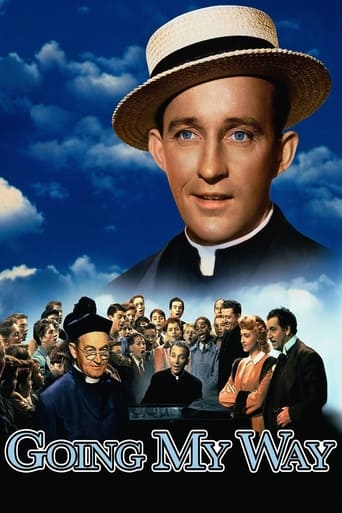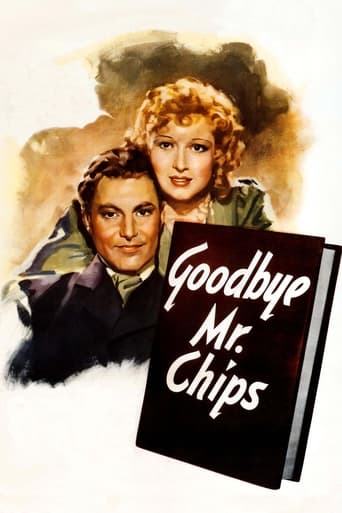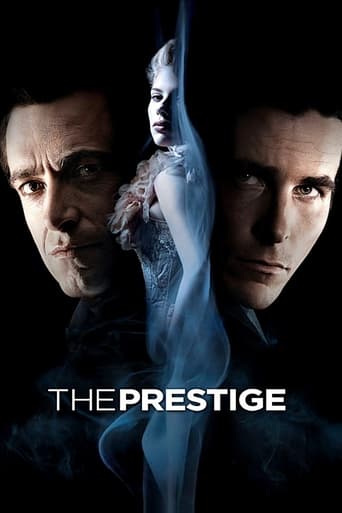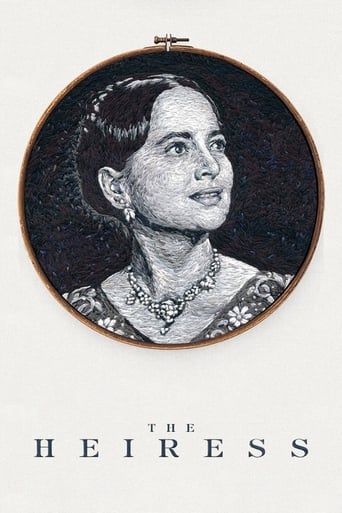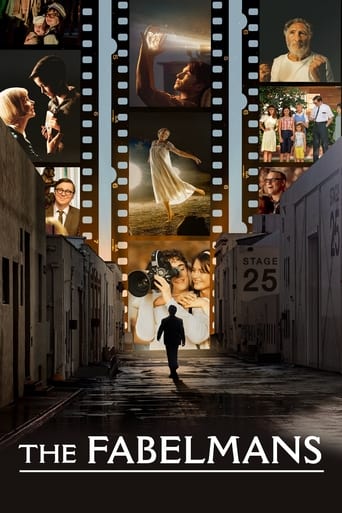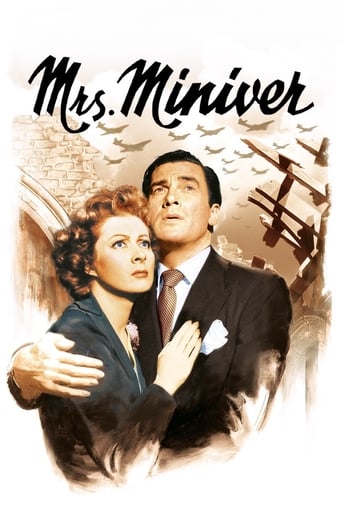


Mrs. Miniver
Middle-class housewife Kay Miniver deals with petty problems. She and her husband Clem watch her Oxford-educated son Vin court Carol Beldon, the charming granddaughter of the local nobility as represented by Lady Beldon. Then the war comes and Vin joins the RAF.
-
- Cast:
- Greer Garson , Walter Pidgeon , Teresa Wright , May Whitty , Reginald Owen , Henry Travers , Richard Ney


Similar titles

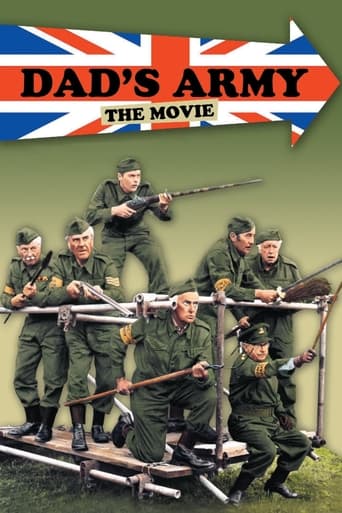
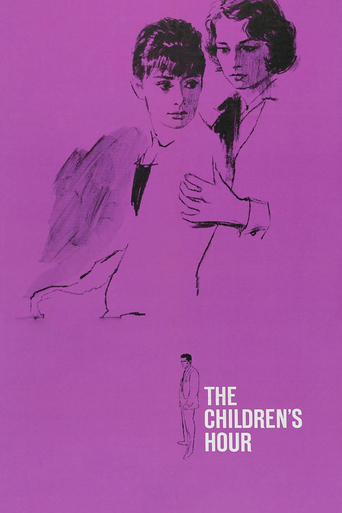

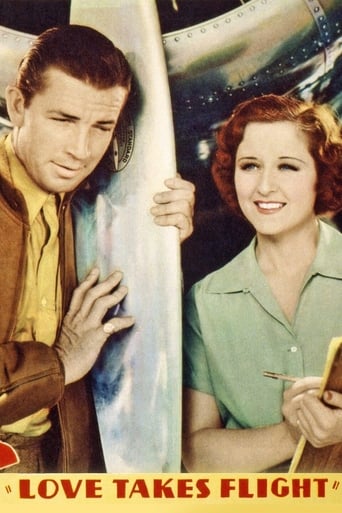

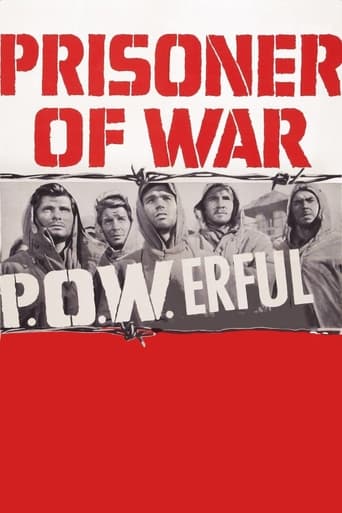
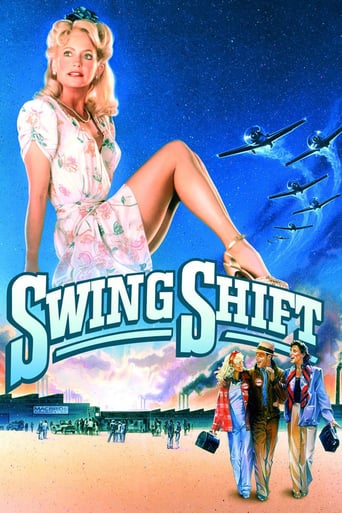
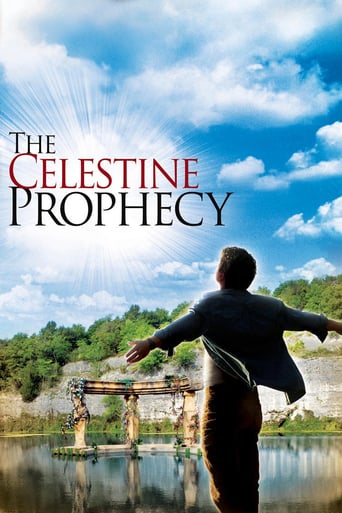

Reviews
Very very predictable, including the post credit scene !!!
In truth, there is barely enough story here to make a film.
Exactly the movie you think it is, but not the movie you want it to be.
A terrific literary drama and character piece that shows how the process of creating art can be seen differently by those doing it and those looking at it from the outside.
I loved the scene in the bomb shelter with Napoleon the cat but was disappointed at the personal growth of Vin who comes back from war with the fresh face and bright eagerness of a boy which made him appear extremely artificial.
I can only imagine the impact this movie must have had on American audiences in 1942--the deep feelings of sympathy it aroused for the British people who were suffering under the incessant Nazi bombings. I'm guessing that it was this movie that made my mother say that her favorite male movie star was Walter Pidgeon (something I could never figure out till I saw "Mrs. Miniver" and realized how much she must have cried seeing it and knowing that my dad would soon be shipped out to England).But in retrospect, the movie needs to be seen also in the context of war-time propaganda and its impact on British and American viewers. The biggest surprise in the movie is surely not that "Lady Beldon" renounces her claim to the village's rose of the year and shows her common cause with "the people". Rather, it was the designation of the Brit who was to be the symbol for all of Britain's war dead. From out of the blue, it turned out to be Lady Beldon's grand- daughter (and a more ethereal, tender and vulnerable creature couldn't have been chosen for the role than Teresa Wright).The obvious choice, and the one everyone in the movie theater must have anticipated, was the Minivers' son as fighter-pilot destined to die in the Battle of Britain (and he almost certainly would have died if he had existed in real life--there were very few fighter pilots who survived from the beginning of war to the end). But the death of a beautiful, young woman, symbol of all the "innocent civilians" to die in the war, surely had a greater impact on the movie-goers. In a sense, it prepared Americans and Brits to understand and accept the logic of Total War, where there are no "innocent civilians".And so it's a strange and sad irony that "Mrs. Miniver" plays a part (a small part, admittedly) in laying the groundwork for the legitimation of the firestorm in Dresden (1945) that killed in a few hours 25,000 Germans, more than half of all the Britons killed over the years of the Nazi bombing of Britain. Just one chapter in the story of the war-time bombing of civilians in the 20th century and beyond.
The first of William Wyler's trio of Best Picture winners, the other great, the other not quite for me, comes with a stigmatic label as he admits it's guilty of a focused agenda. Made to provoke an emotional urgency for the Americans to join the second World War, Mrs. Miniver does often feel like overt propaganda. However, the sentiment of its melodrama is no less emotionally valid, and it often has some creative ways to deliver it in its resulting poignant third act. It is that final stretch which makes the film as it otherwise suffers from its episodic structure that only makes it sporadically engaging during lightweight sequences. It's otherwise saved by the terrific performances from its Oscar winning pair Greer Garson and Teresa Right who outshine their sometimes overacting supporting cast with nuanced and compassionate performances. At least the photography and production is relatively exquisite despite the limitations of an industry yet to be completely radicalised by Orson Welles. Yes, it's melodrama, but it's good melodrama, and it's stayed in the hearts of those who saw it in the 40s. Deserving of Best Picture? Not quite, but they could do worse. It does feel like its wins were making a statement however.7/10
Directed by German-born American citizen William Wyler, depicting the plight of the British Home Front, Mrs. Miniver swept the boards at the Oscars, collecting five wins including Best Picture. It is now clearly a piece of propaganda film-making, made at the time where the U.S. were edging closer and closer to war, but this doesn't do anything to dampen what is an often gripping, moving and stirring film. Wyler's views are clear as day - American needed to enter the war before the threat of Nazism becomes too powerful to overthrow - and wanted to show the American audience of the stubborn, stiff-upper lipped efforts of its British allies, from the soldiers on the front lines, to the defiance of the women and the elderly at home.As World War II draws inevitably nearer, middle-class housewife Kay Miniver (Greer Garson) journeys home after shopping to learn that station-master Mr. Ballard (Henry Travers) is naming his potentially prize-winning rose "Mrs. Miniver". Her husband Clem (Walter Pidgeon) has just indulged in an expensive new car and the two patter around admitting to their lavish spending. Their son Vin (Richard Ney) returns home from Oxford and falls in love with Carol (Teresa Wright), grand- daughter of aristocrat Lady Beldon (Dame May Witty). But when war is announced, Vin joins the Air Force, and Clem volunteers to assist in the Dunkirk evacuation.What is most surprising about Mrs. Miniver is its depiction of Britain. With an American director and a cast made up mostly of American and Canadian actors, the film is alarmingly successful in its realism, and doesn't look out of place amongst the many British films made during this era with similar settings. The cast border on perfection (apart from the slightly hammy Richard Ney), and Pidgeon, Wright, Witty and Travers all receiving Oscar nominations for the efforts, with Garson winning. They manage to juggle a mixture of middle-class kitchen-sink drama and some naturalistic humour, with some playful scenes managing to alleviate the doom-and-gloom subject matter.The film is keen to explore themes of social divide, and how this apparent barrier seems to vanish and diminish during wartime. Vin arrives home from his college spouting a new-found enlightenment about his fellow man, and how the wealthy live comfortably in ignorance while the lower-classes suffer, but has nothing to say when challenged as to what he's doing about it by Carol. It is only when he goes to war when he is truly with his fellow man, a revelation shared by the snobbish Lady Beldon (in a powerhouse performance by Dame Witty) during the village flower show in an extremely moving scene.A true milestone film, now admitted to the National Film Registry by the Library of Congress, that President Roosevelt heralded as being as important to the war effort as the soldiers on the ground, as he rushed it straight into theatres shortly after being completed. The film's famous final scene that shows a powerful speech on the country's unity by the Vicar (Henry Wilcoxon - whose brother Robert was killed in the Dunkirk evacuation), was transcribed and translated by Roosevelt and dropped into allied territory as a morale builder, and is now known as the Wilcoxon Speech. Historically important, but a magnificent film in its own right.www.the-wrath-of-blog.blogspot.com



